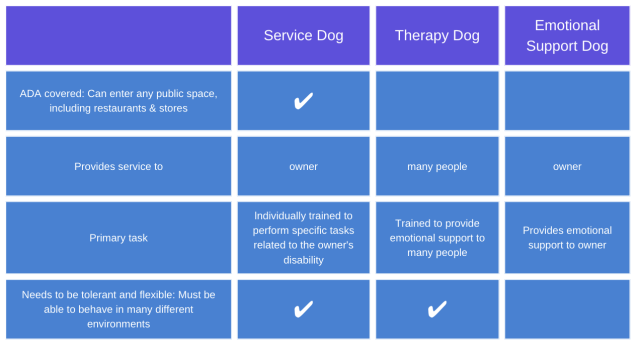Therapy
Don't Confuse Service, Therapy, and Emotional Support Dogs
Different dogs provide different services and have distinct accommodations.
Posted January 23, 2023 Reviewed by Davia Sills
Key points
- Service dogs, therapy dogs, and emotional support dogs provide different services and get different accommodations.
- Service dogs are covered under the American Disabilities Act and must be allowed in public spaces like restaurants, hotels, and stores.
- Therapy dogs are trained to provide emotional support to many different people; they must be invited into spaces that don't usually allow dogs.
- Emotional support dogs help specific people; they are not covered by ADA but may be accommodated in housing that normally excludes pets.

Dogs are versatile, varying from the tiniest Pekinese to the leggy Afghan or massive Newfoundland. Dogs have been bred to hunt rats, run deer, tend sheep, rescue sailors, or sit calmly on the laps of the aristocracy. They herd our cattle and play with our kids.
Dogs are uniquely trainable, and we are uniquely able to read their facial expressions. Dogs have evolved to "speak" to us. One difference between dogs and wolves is dogs' facial musculature, which allows dogs to communicate emotions to humans. We have co-evolved to work together.
Service Dogs, Therapy Dogs, and Emotional Support Dogs: What's the Difference?
Although many pet dogs (also called "companion animals") provide comfort and support to their owners, only some dogs are granted a special status that allows them to accompany their owners in areas where dogs are not normally allowed.
In the U.S., service dogs, therapy dogs, and emotional support dogs perform different tasks and have different legal statuses. It is actually illegal to misrepresent the status of your dog to gain services or access—buying a vest with the label you want is not enough!
Service dogs
A service dog is individually trained to perform specific tasks to assist an individual with a disability. Those disabilities are defined under the Americans with Disabilities Act (ADA), and the tasks service dogs perform must be specific to that disability. Common service dogs include seeing-eye dogs, seizure dogs that alert their owners to oncoming seizures, or dogs that help their owners cope with PTSD or anxiety attacks. Service dogs are allowed to accompany their owners in public places, including restaurants, hotels, and stores, and are protected under federal law.
- Service dogs are individually trained to perform specific services for a specific person with a documented disability. They perform tasks like fetching medicine, guiding owners through traffic, notifying owners of an oncoming seizure or low blood sugar, or moving owners to safe areas when they are unable to do so themselves.
Therapy dogs
A therapy dog is trained to provide comfort and support to many different people in many different settings. Therapy dogs are chosen for their friendly, calm, and flexible temperament and their ability to work well with a wide variety of people.
Therapy dogs can work anywhere but frequently visit hospitals, nursing homes, schools, libraries, and mental health facilities. They are being used to work with children and adults in stressful situations like court or foster care. They may be trained to work in crisis situations, such as disasters, mass shootings, or accident scenes. They work closely with their handler and function as part of a team. There are a number of national organizations that provide training, certification, and insurance for therapy dog-owner teams.
Therapy dogs are not protected under federal law. They are only allowed in dog-limited settings, like schools, libraries, or hospitals, when the hosting organization has invited them.
- Therapy dogs are trained to be friendly and supportive of many people. They will often work with each person only once. They are selected for their friendly, adaptable temperament. Therapy dogs and their handlers are certified as teams. They are not protected by federal law and must be invited into settings that normally do not allow dogs.
Emotional support dogs
An emotional support dog provides emotional support to a specific individual with a mental or emotional disability, such as anxiety or depression. Emotional support dogs are not trained to perform specific tasks but are considered essential to their owner's well-being. While emotional support dogs may be allowed to live with their owners in housing that does not allow pets, they have no public access rights under federal law. They are not required to have special training, but if they are used to gain access to housing that does not normally accommodate dogs, their owner's need for them must be documented, and they must behave appropriately.
- Emotional support dogs are not specifically trained but provide essential emotional support to their owners. Housing that does not normally allow pets may be required to accommodate emotional support dogs. Although federal law does not cover public access, some localities or states provide broader accommodations for emotional support dogs.
Summary:
Any dog breed can act as a service, therapy, or emotional support dog. It is their training and function that distinguishes them. Dogs can be trained by professionals or by their handlers. Working dogs do not need to be identified with a special vest or harness. Similarly, wearing a vest doesn't mean the dog is what it purports to be!
As can be seen in the chart below:
- Only service dogs are entitled to ADA accommodations and are allowed to enter any public space.
- Service and emotional support dogs are oriented towards one person—their owner—and should not be distracted by other people when they working.
- Therapy dogs work with their handlers to provide emotional support to many different people, often seeing the people they are helping only once.

Many companies advertise on social media, claiming that ‘registering’ pets as emotional support dogs guarantees public access and allows dogs to visit stores and restaurants and travel with you in the cabin of airlines. This is untrue. Only service dogs are guaranteed public access under federal law. Because of abuse by pet owners who want to bring their dogs into public spaces, many locales have passed laws making it illegal to misrepresent your dog as a service or emotional support animal if they are not. Therapy dogs are never guaranteed access to public spaces or pet-free housing unless they are invited into the space. In addition, many people are afraid of or allergic to dogs. Poorly trained dogs create problems for people with legitimate needs for service dogs and for the dogs themselves. Service dogs have been injured by poorly trained or poorly supervised dogs in the course of their work.
Service, therapy, and emotional support dogs are invaluable and a testament to the human-dog bond. Know the difference!




